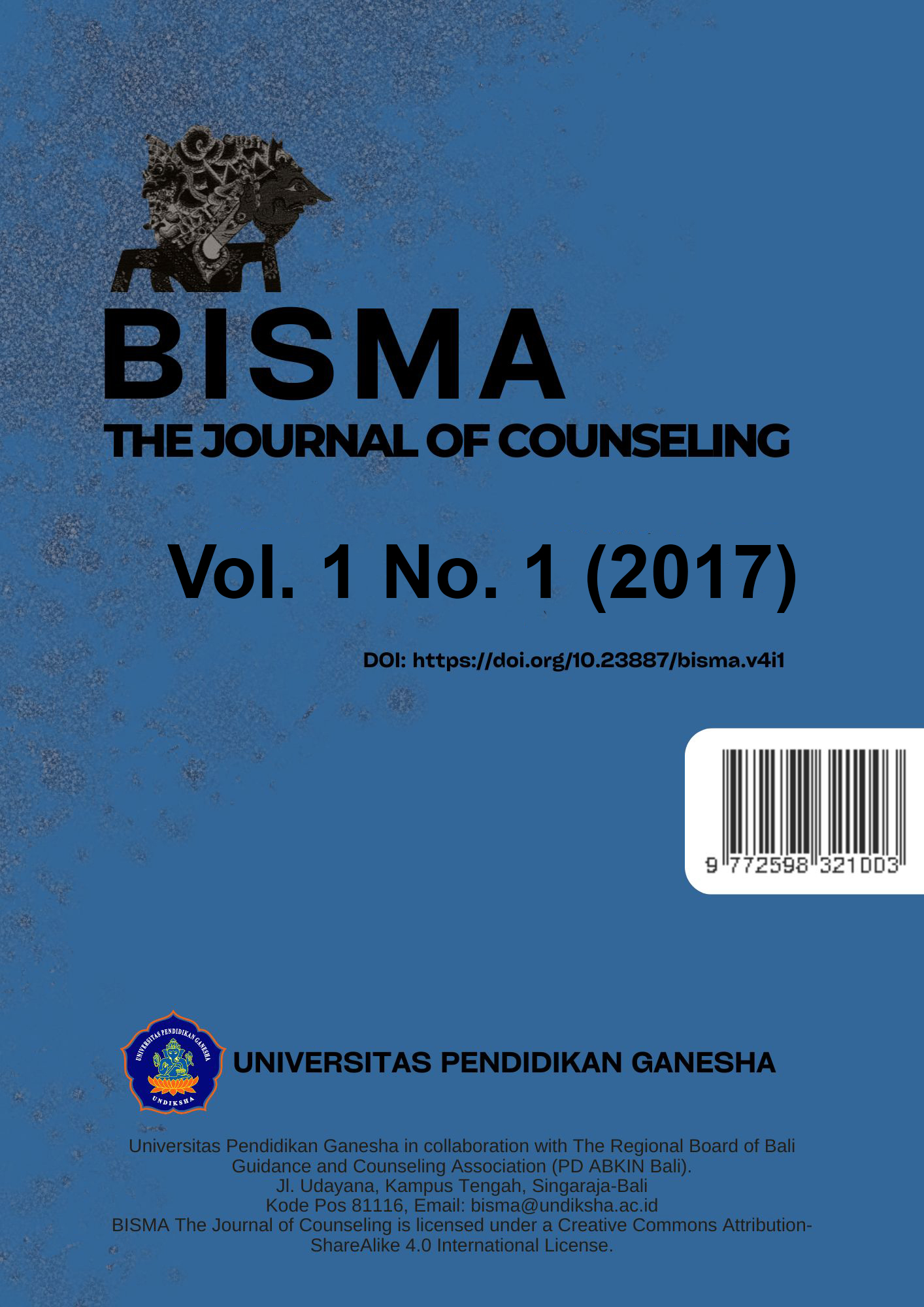Gestalt Counseling Effectiveness with Engineering Techniques to Increase Self-Consideration in Learning Process
DOI:
https://doi.org/10.23887/128302017Keywords:
gestalt counseling, walking technique, confidenceAbstract
Confidence is important to be possessed by students through the learning process, students who have low self-confidence will be less optimal in developing ability. This study aims to determine the effectiveness of gestalt counseling with the technique around to improve confidence in the learning process in students of class XI MIA 4 SMA Negeri 1 Singaraja academic year 2016/2017. This type of research is pre-experimental with one group pretest-posttest design. Samples of research were six students selected through purposive sampling technique. Methods of data collection using a confident questionnaire that has been calculated the validity and reliability. The subjects from the study were students of class XI MIA 4 who had low self-esteem. Data analysis technique used is t-test statistical analysis technique. The results from the analysis, found that gestalt counseling with the technique of traveling can increase confidence. It is concluded from the analysis result, t count> table with significance level 5% (4, 38> 2, 015). The results from the analysis show that the hypothesis proposed in this study is acceptable. As the implication of this research is expected to be an alternative for counseling teachers in schools in improving student self-confidence.References
Antari, Ni Nengah Madri. (2014). Buku Ajar Belajar dan Pembelajaran. Jurusan Bimbingan konseling, Fakultas Ilmu Pendidikan: UNDIKSHA Singaraja.
Arikunto, S. (2005). Manajemen Penelitian. Jakarta: Rineka Cipta.
Arif, Antonius. (20140. Resource Therapy, Ego State Therapy of Gordon Emmerson. Jakarta: Spasi Media.
Anak, P., Sd, D., Belajar, K., & Pendidikan, D. (n.d.). Hakikat Pendidikan di Sekolah Dasar.
Chambers, R. A., Taylor, J. R., & Potenza, M. N. (2003). Developmental Neurocircuitry of Motivation in Adolescence: A Critical Period of Addiction Vulnerability. American Journal of Psychiatry, 160(6), 1041–1052. https://doi.org/10.1176/appi.ajp.160.6.1041
Chang, D., Dooley, L., & Tuovinen, J. E. (n.d.). Gestalt Theory in Visual Screen Design – A New Look at an Old Subject.
Clayton, P. E., Cuneo, R. C., Juul, A., Monson, J. P., Shalet, S. M., & Tauber, M. (n.d.). Consensus statement on the management of the GH-treated adolescent in the transition to adult care. European Journal of Endocrinology, 152, 165–170. https://doi.org/10.1530/eje.1.01829
Corey, Gerald. (2003a). Teori dan Praktek Konseling dan Psikoterapi. Bandung: PT Refika ADITAMA
Corey, Gerald. (2013b). Teori dan Praktek Konseling dan Psikoterapi. Bandung: PT Refika ADITAMA
Dantes, Nyoman. (2014a). Analisis dan Desain Eksperimen. Singaraja: Program Pascasarjana Undiksha.
Dantes, Nyoman. (2012b). Metode Penelitian. Yogyakarta: Andi Offset.
Desolneux, A., Moisan, L., & Morel, J.-M. (n.d.). From Gestalt Theory to Image Analysis.
Djiwandono, Sri Esti Wurdani. (2005). Konseling dan Terapi dengan Anak dan Orangtua. Jakarta: PT Grasindo.
Graber, J. A., & Brooks-Gunn, J. (1996). Transitions and Turning Points: Navigating the Passage From Childhood Through Adolescence. Developmental Psychology, 32(4), 768–776.
Gunarsa, Singgih D. (2004). Konseling dan Psikoterapi. Jakarta: PT BPK Gunung Mulia
Hartono dan Soedarmadji. (2012). Psikologi Konseling : Edisi Revisi. Jakarta: Kencana.
Hertiavi, M. A., Langlang, H., Khanafiyah, S., Negeri, S., & Jurusan Fisika, K. (n.d.). Penerapan Model Pembelajaran Kooperatif Tipe Jigsaw Untuk Peningkatan Kemampuan Pemecahan Masalah Siswa SMP.
Jenderal, D., Non, P., Dan, F., Direktorat, I., Kursus, P., Kelembagaan 2009, D., … Rasional, A. (n.d.). MUSIK KEMENTERIAN PENDIDIKAN NASIONAL.
Kartono, Kartini. (1997). Patologi Sosial. Jakarta: CV. Rajawali.
Karacop, A., & Doymus, K. (n.d.). Effects of Jigsaw Cooperative Learning and Animation Techniques on Students’ Understanding of Chemical Bonding and Their Conceptions of the Particulate Nature of Matter. https://doi.org/10.1007/s10956-012-9385-9
Komalasari, Gantina., dkk. 2011. Teori dan Teknik Konseling. Jakarta: PT. Indeks.
Lubis, Namora Lumongga. 2011. Memahami Dasar-Dasar Konseling dalam Teori dan Praktik. Jakarta: Kencana.
Mattingly, R. M., & Vansickle, R. L. (n.d.). Cooperative Learning And Achievement In Social Studies: Jigsaw Ii Cooperative Learning And Achievement In.
Montemayor, R. (n.d.). Parents and Adolescents in Conflict: All Families Some of the Time and Some Families All of the Time.
Murphy, L., Blaha, K., Vandegrift, T., Wolfman, S., & Zander, C. (n.d.). Active And Cooperative Learning Techniques For The Computer Science Classroom.
Malahayati. 2010. SUPER TEENS, Jadi Remaja Luar Biasa dengan Kebiasaan Efektif. Yogjakarta: Percatakan Galangpress
Mappiare AT, Andi. 2004. Pengantar Konseling dan Psikoterapi. Jakarta Utara: PT Raja Grafindo Persada
Mulyasa, E. 2009. Implementasi KTSP Kemandirian Guru dan Kepala Sekolah. Jakarta: Bumi Aksara.
Margono. 2005. Metodologi Penelitian Pendidikan. Jakarta: PT Rineka Cipta.
Nurkancana, Wayan Sunartana. 1990. Evaluasi Hasil Belajar. Surabaya: Usaha National.
Prayitno dan Erman Amti. 2004a. Dasar-Dasar Bimbingan dan Konseling. Jakarta: Direktorat Jenderal Pendidikan Tinggi.
Prayitno dan Erman Amti. 2004b. Dasar-Dasar Bimbingan dan Konseling. Jakarta: PT Rineka Cipta.
Sedanayasa, Gede dan Kadek Suranata. 2009. Buku Ajar: Dasar-Dasar Bimbingan Konseling. Singaraja: Jurusan Bimbingan Konseling, Fakultas Ilmu Pendidikan: Universitas Pendidikan Ganesha.
Subini, Nini. 2014. YOU CAN DO IT, Ragam Ide Jitu Penangkal Rasa Grogi. Jakarta Selatan: Flash Books
Sugiono. 2009. Metode penelitian Kualitatif Kuantitatif dan R&D. Bandung: ALFABETA
Suarni, Ketut. 2014. Modul perkembangan Individu. Singaraja: UNDIKSHA
Sukardi, Dewa Ketut. 2002a. Pengantar Pelaksanaan Program Bimbingan dan Konseling di Sekolah. Jakarta: PT. Rineka Cipta.
Sukardi. 2003b. Metodologi Penelitian Pendidikan. Jakarta: PT Bumi Aksara.
Undang-Undang Sistem Pendidikan Nasional. (n.d.).
Widjaja, Hendra. 2016. Berani Tampil Beda dan Percaya Diri. Yogyakarta: Araska
Yeo, Anthony. 2003, Konseling Suatu Pendekatan Pemecahan Masalah, Jakarta: PT BPK Gunung Mulia.
Yamaguchi, K., & Kandel, D. B. (n.d.). Patterns of Drug Use from Adolescence to Young Adulthood: II. Sequences of Progression.








